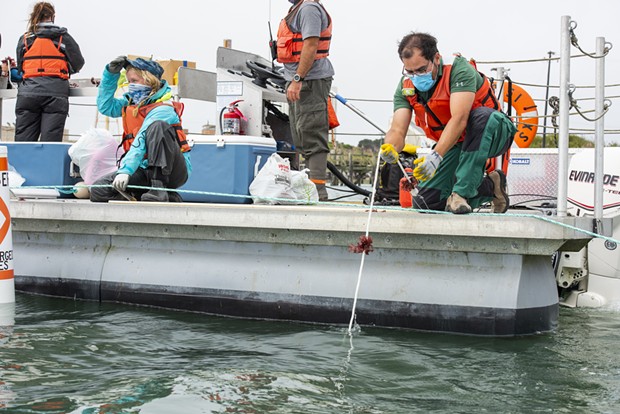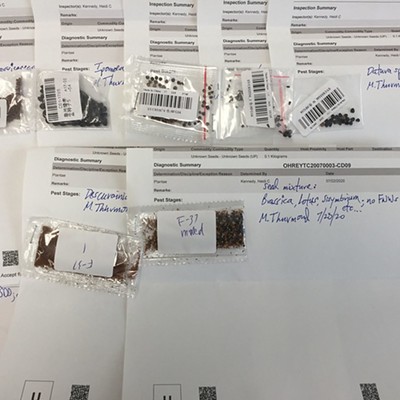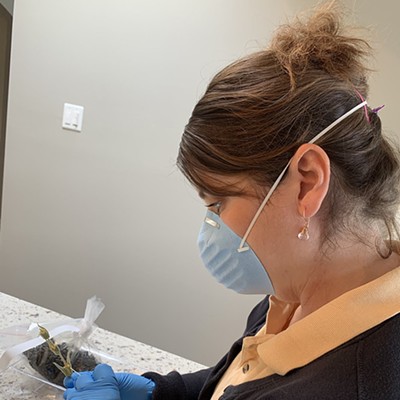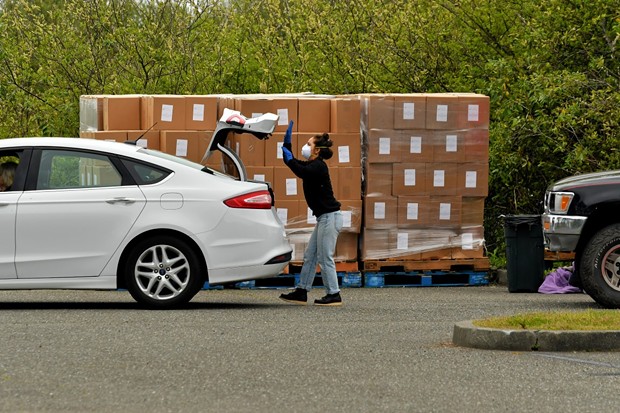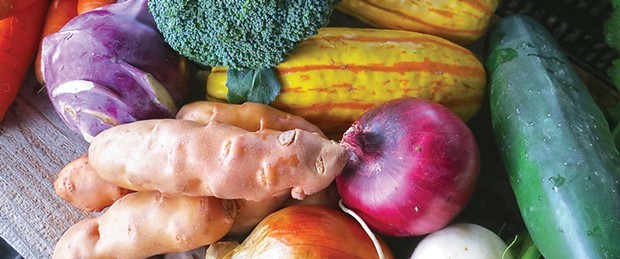Agriculture
Monday, February 14, 2022
A Democrat Wants to Crack Down on Employers that Exploit Workers. Will this help?
Posted By Melissa Montalvo and Melissa Montalvo/CalMatters on Mon, Feb 14, 2022 at 10:57 AM
The bill is cosponsored by the Western Center on Law and Poverty and the Sunita Jain Anti-Trafficking Policy Initiative at Loyola Law School.
“We must establish a Labor Trafficking Unit to help stop this cruel and inhumane treatment of workers who only want to make a living and provide for their families,” the Democratic lawmaker said. “For the first time, California would have a unit specifically assigned to investigate and prosecute unscrupulous perpetrators.”
The bill authors said that, while the state has primarily directed its efforts and attention to sex trafficking over the years, there has been no coordinated effort focused on labor trafficking.
If the bill passes, the unit would reside under the California Department of Industrial Relations as a subdivision of Cal/OSHA and would investigate and prosecute complaints alleging labor trafficking.
California first enacted anti-trafficking laws 15 years ago, yet no state agency currently has a mandate to look for labor trafficking.
“Despite some progress, California continues to have the highest number of victims of human trafficking in the U.S. over the last two decades,” said Joseph Villela, policy director at Loyola Law School’s Sunita Jain Anti-Trafficking Policy Initiative.
The unit would also take measures to ensure the prosecution process does not victimize survivors and that they are informed of services available to them.
How prevalent is labor trafficking?
The U.S. Department of Justice defines human trafficking as a crime that involves exploiting a person for labor, services or commercial sex.
According to the Department of Industrial Relations, human trafficking is the world’s fastest-growing criminal enterprise and is an estimated $32 billion-a-year global industry.
The Little Hoover Commission, an independent state oversight agency in California, found that the state does not know the extent of labor trafficking in California because it doesn’t track this kind of data.
In an email statement to the Bee, Pedro Nava, chair of the commission, called the bill “a key step forward” for investigating labor trafficking crimes.
The commission estimates that labor trafficking survivors account for about 22 percent of the more than 14,000 human trafficking survivors who received state assistance from 2016 to 2019.
Preliminary data analyzed by the commission showed labor trafficking survivors who sought help include men and women of all ages working in a wide range of industries.
According to the National Human Trafficking Hotline, domestic work, and agriculture work are the most common types of employment that see labor trafficking in California.
And the pandemic may have made the problem worse.
A 2021 analysis conducted by the Polaris Project, a nonprofit that aims to prevent sex and labor trafficking in North America, found that labor trafficking in agriculture may have increased during the COVID-19 pandemic. The report found that the proportion of reported labor trafficking victims with temporary agricultural work visas, or H-2A visas, increased from approximately 11 percent to 25 percent.
In November 2021, a federal court in Georgia found that a group of smugglers was fraudulently using the H-2A work visa program to smuggle foreign nationals from Mexico, Guatemala and Honduras into the United States under the pretext of serving as agricultural workers. The workers were subject to brutal working and living conditions, and at least two died due to workplace conditions.
“People are being forced into labor trafficking right now in California — most coming from poverty conditions,” said Christopher Sanchez, a policy advocate at the Western Center on Law and Poverty. “The introduction of this bill sends a message that California will not tolerate the exploitation of workers and their families.”
What to do if you have information about labor trafficking
If you believe you have information about a potential trafficking situation, you can call the National Human Trafficking Hotline at 1-888-373-7888 or text the National Human Trafficking Hotline at 233733. Message and data rates may apply.
You can also visit their website to report a tip online.
Anti-Trafficking Hotline Advocates are available 24/7 to take reports of potential human trafficking.
All reports are confidential and you may remain anonymous. Interpreters are available by phone.
The information you provide will be reviewed by the National Hotline and forwarded to specialized law enforcement and/or service providers where appropriate.
You can also report employers suspected of engaging in unlawful activity to the state’s Labor Enforcement Task force at: 855-297-5322, via email at [email protected], or by visiting their website at www.dir.ca.gov. Spanish resources available.
Melissa Montalvo is a reporter with The Fresno Bee and a Report for America corps member. This article is part of The California Divide, a collaboration among newsrooms examining income inequity and economic survival in California.
Wednesday, April 21, 2021
Humboldt County Fair Announces Dates, Fundraiser for the Ponies
Posted By Kimberly Wear on Wed, Apr 21, 2021 at 12:29 PM
According to a news release, the fair has set up a "Horses to Humboldt" GoFundMe page to help owners make their way to Ferndale this summer for a return of the races.
The campaign has so far raised $5,000 of the $50,000 goal.
Read the full release and find more information on how to become a vendor below:
The Humboldt County Fair has announced their planned fair dates for the 2021 Humboldt County Fair. If all goes well with reopening plans, the Fair will be held starting Wednesday, August 18th and running through Sunday, August 29, 2021.
The Theme of the fair was chosen at the last Board meeting, “A County Fair with a Western Flair.” All phases of the fair are in the planning stages including Horseracing, Carnival, Vendors, Exhibits and Livestock. In an effort to secure more horses to run during the fair, there is currently a “Horses to Humboldt” GoFundMe page set up to help horses make the trip to Ferndale.
It’s been a tough year for horses too as they have not been able to run races. Over the years, the cost for horse owners to travel, stall, feed, and insure their horses has continually gone up. The campaign is an effort to keep the local tradition alive of making heart-warming memories in Ferndale during the sunny days at the fair enjoying the horse races with friends and family by offering incentives to horse owners to attend.
The “Horses to Humboldt” GoFundMe page can be found on the Humboldt County Fair’s Facebook page, or you can contact the fairgrounds office directly if you want to donate. The Fair is also looking for Vendors who would like to sell and promote their products and services in our Commercial Building during the fair.
Applications for commercial Vendors can be found on the HCF website https://www.humboldtcountyfair.org, by emailing [email protected], or by calling the Fair office at (707) 786-9511.
For more information about the fair, check for progress updates on their website, https://humboldtcountyfair.org/ or follow Humboldt County Fair on Facebook! We are looking forward to an exciting 2021 “County Fair with a Western Flair.”
Sunday, October 11, 2020
Cooperation Humboldt to Take on Local Food Guide Publication
Posted By Nora Mounce on Sun, Oct 11, 2020 at 9:00 AM
“The Local Food Guide shines a spotlight
on our vibrant local food scene,” says Locally Delicious founding member Ann
Anderson. However, fellow member (and Journal
contributor) Pat Bitton says, “we're all seniors now and
it's simply too much work for our core team…, not to mention the distribution
challenges we've encountered this year because of COVID-19.”
After four
years, Locally Delicious is ready to pass on the project to an organization
with more energy and resources. In 2021, publication of the Local Food Guide will be taken on by
another nonprofit organization, Cooperation Humboldt. With a focus on building
a “solidarity economy,” Cooperation Humboldt is already invested in food and
sustainability programs like community gardens and fruit trees, Free Little
Pantries, and Food Not Lawns. Read more about Cooperation Humboldt’s roots and
programs here.
Tuesday, September 15, 2020
Day-Passes for Farmers in Fire Zones Available
Posted By Kimberly Wear on Tue, Sep 15, 2020 at 9:38 AM
One vehicle per pass will be allowed to visit sites in the evacuation zone between 10 a.m. and 6 p.m. The passes will be available at the county’s Redway office, 3156 Redwood Dr. Individuals will be required to show ID that must match the owner listed on a property’s permits.
“Law enforcement staffed at road closures will check the passes upon entry and exit of the evacuation order zone,” the county release states. Passes are approved by Cal Fire on a daily basis. “Some licensed farmers may not be approved to access the evacuation zone due to proximity of the fire and conditions on that particular day.”
For questions about the evacuation zone access passes, contact:
Humboldt County Planning & Building - Redway Office: 707-383-4100
Humboldt County Planning & Building - Eureka Office: 707-445-7541
Humboldt County Evacuation Information Line: 707-268-2500
Single day access passes to evacuation order zones now available for licensed agriculture and livestock farmershttps://t.co/Vowao8zyjf pic.twitter.com/5IMozI2cpU
— Humboldt Co OES (@HumCoOES) September 15, 2020
Read the full release below:
Friday, September 11, 2020
HSU's Humboldt Bay Seaweed Farm (VIDEO)
Posted By Iridian Casarez on Fri, Sep 11, 2020 at 2:56 PM
“Seaweed farming is an industry that is about 500 years old,” said farm co-designer, HSU Fisheries Biology Associate Professor Rafael Cuevas Uribe. “But this is going to be the first time here in California that somebody’s doing red seaweed at commercial scale in open waters.”
The pilot project called HSU-ProvidenSea is led by HSU and supported by GreenWave, an environmental nonprofit that helps coastal communities to launch and scale regenerative ocean farms.
The seaweed that will be farmed is native to Humboldt Bay and will create habitat and will hinder ocean acidification, cleaning the water by absorbing excess phosphorus and nitrogen.
Saturday, August 1, 2020
Ag Officials: Don't Plant the Mystery Seeds
Posted By Kimberly Wear on Sat, Aug 1, 2020 at 8:43 PM
So far, about 20 local residents have reported being on the receiving end of the deliveries that appear to be from China, Agricultural Commissioner Jeff Dolf said in an email to the Journal.
“At this point we have collected six seed shipments and are still encouraging members of the public who have received seeds to contact the Agricultural Commissioner’s Office so we can make arrangements to secure the seed,” he wrote.
Humboldt County is by no means the only place this is happening. The packets have arrived in at least 22 states as well as Canada, countries in the European Union and Australia, according to the U.S. Department of Agriculture. Officials are asking residents not to open the packages but instead turn them over for testing.
It’s also not a new problem, per se. Dolf states in his email that “the U.S. Customs and Border Protection estimates that there were 15,000 interceptions of seeds from all sources worldwide and 5,000 from China and Hong Kong in 2019.”
So, what’s the deal with these latest enigmatic arrivals? No one is quite sure but the USDA put out a statement earlier this week saying there was no evidence to indicate it's anything other than a “brushing scam,” in which internet sellers send out goods then try to increase sales by posting false customer reviews.
“We have identified 14 different species of seeds, including mustard, cabbage, morning glory and some herbs like mint, sage, rosemary, lavender, then hibiscus and roses,” said Osama El-Lissy, deputy administrator for the Animal and Plant Health Inspection Services’ Plant Protection and Quarantine, said in an interview on the USDA website. “The main concern is the introduction of pests and disease that could be harmful to U.S. agriculture.”
While the plants El-Lissy listed might sound rather benign, some morning glory species are highly invasive — as anyone who has the dreaded bind weed in their yard can attest — and the same goes for mint.
“We are working closely with (U.S. Customs and Border Protection) to intercept illegally imported seed packages,” the USDA said in a news release. We’re also working with other federal authorities, the U.S. Postal Service, express carriers and online marketplaces to stop future deliveries.”
Back in Humboldt, Dolf also noted the seeds could potentially harm local crops as well as the region’s native habitat. To ensure the threat is minimized, he asks anyone who’s received one of the packages to contact his office.
“Seeds can vector viruses, bacteria, nematodes and weed seeds, all of which could be potentially harmful to agriculture and the environment in the U.S.,” he said. “The Agricultural Commissioner’s Office is collecting seeds locally and will send them to state or federal authorities for testing.”
Saturday, May 30, 2020
Pandemic Widens Gaps in Regional Food Supply Chain
Posted By Linda Stansberry on Sat, May 30, 2020 at 10:37 AM
“It’s been a big question for a while,” says May Patino, HFPC coordinator. “Do we have enough food to sustain the people who live in this region? The reality is we don’t actually know.”
In 2018, the California Department of Public Health released a study revealing that roughly one quarter of Humboldt County children experience food insecurity. Food deserts – census tracts where residents live more than 10 miles from a major grocery store or have little access to transportation to get to fresh food – are one cause of food insecurity. Humboldt County has 10 such census tracts (out of 31 total).
HFPC recently received a grant from the Humboldt Area Foundation to create an emergency food system response that would help pool and share distribution among different organizations. (Full disclosure: I am employed part-time by HAF.) One model under consideration would use a central and satellite hubs for distribution – a place where farmers, for example, could bring product that would be repackaged and redistributed at scale to need.
“We’re hoping this will turn into something that will be adapted and can be reactivated in emergency food situations,” says Patino “We would like to increase some long term food sustainability systems in the region.”
The North Coast Grower’s Association has already taken steps to aggregate supply by creating the Harvest Box Program – a multi-farmer CSA that families can order through the NCGA website.
Michelle Wyler, managing director of the Farm to Market program for the Community Alliance with Family Farmers, praised the nimble response of local farmers to COVID’s challenges.
“In general, when COVID hit folks, we had to think about pivoting pretty immediately to more direct sales models,” she says.
Wyler works with farmers statewide and says the Humboldt food system had some advantages, including a well-established sales base in local farmers markets and a later start to the growing season that gave local producers more time to figure out a response. While in other parts of the state some farmers have had to scale back or dump product because they couldn’t sell it or pay for the labor to harvest product, in Humboldt farmers are maintaining or even ramping up production to meet demand.
“It’s been a resurgence for the local food market,” says Wyler, adding that another advantage is that local farmers are less reliant on restaurant or wholesale sales, and thus the restaurant industry’s nosedive due to shelter in place is not having the same ripple effects on farmers that it might in other areas of the state.
“A next step would be figuring out what product is viable locally,” says Wyler. “Local product is not going to fill demand.”
To meet demand through larger suppliers and non-local producers, the problem is again distribution. Humboldt County is often compared to an island because of its rural remove from the rest of the state and — like an island – some worry that it could be cut off from the supply chain entirely.
Melanie Bettenhausen, HFPC member and former general manager of the North Coast Co-Op, thinks about distribution a lot.
“We’re so dependent on food that’s coming [from] out of the area,” she says, adding that unwieldy nature of some federal relief programs has revealed the vulnerability of our isolation. “Just participating in some of the USDA programs that are related to COVID-19 relief— they don’t go through our area. They’re for Northern California and Santa Rosa is Northern California. You have to convince drivers to divert from the I-5. And then often they have to be reloaded onto a smaller truck so they can get through Richardson Grove.”
This is true, too, she says, for grocery stores and other wholesale suppliers, many of which struggled to keep ahead of product shortages in the early days of the pandemic. This bottleneck exacerbated an existing problem for small service providers, especially those in rural areas.
“The thing we have keyed into in relation to pandemic is we have organizations who need access to food and they aren’t able to order from distributors, and they also aren’t able to purchase enough of the supplies they need at the store,” Bettenhausen says. “They’re treating all organizations the same.”
Bettenhausen says many smaller nonprofits, such as those that feed or house people, go to Costco or WinCo and buy what their clients need at retail prices, which is not cost effective. But most distributors have a minimum order price that is out of reach for nonprofits. A distribution hub model would be a better solution — allowing bulk purchasing that could be aggregated and then redistributed according to need. But that model comes with its own logistical challenges: cold storage, billing, moving product in and out of the facility. And then there’s the continued challenge of reaching rural areas, which would require refrigerated trucking and a sustainable financial model.
“Our food system feels precarious,” Bettenhausen says. “I personally think we need some policies at the county level addressing food policies and a system response to need. I saw the lack at the co-op when we had the planned power outage, all that food going to waste. The assumption was that those grocery stores are there to sell food but what if they can’t? The solution could be as simple as a partnership with the county to make sure grocery stores have generators.”
These supply chain issues, Bettenhausen says, have been apparent for a long time. It’s only now that they’ve become a more urgent priority.
“These are things are things we’ve known, but a lot of times because there’s no crisis, we have no momentum,” she said. COVID-19 may have changed that.
Editor's note: This story has been updated to reflect the correct number of census tracts in Humboldt County, which is 31, not 25. We apologize for the error.
Wednesday, May 6, 2020
Farmers Markets Return with New Rules
Posted By Kali Cozyris on Wed, May 6, 2020 at 2:26 PM
Farmers markets, like grocery stores, are deemed essential businesses. And with the opportunity to support local farmers who need it now more than ever, and to get nutrient-rich, delicious produce that has likely been handled less than it is in stores, we'll take it.
Our familiar farmers markets are opening up but things look a little different. For instance, at the Saturday Arcata Farmers Market, you won’t see crowds milling about socializing, weaving in and out of the streets and plaza grass, walking between vendors, hula hooping or lounging around listening to live music. There’s no sampling. No groups of friendly strangers sharing space at the stand’s counters touching produce and handing vendors cash. And while that may not sound like a good thing in a regular mid-May in Humboldt scenario, in these circumstances, it is.
Monday, April 20, 2020
Public Health to Cannabis Farmers: Hire Local
Posted By Thadeus Greenson on Mon, Apr 20, 2020 at 3:29 PM
"I'd like to have farmers prioritize hiring people from within the area so we minimize the introduction of travelers and recognize that all people coming into the area need to be quarantined for 14 days prior to mixing with the general workforce," she said in the short video, which can be found embedded below.
Thursday, April 2, 2020
Redwood Acres Fair Canceled
Posted By Jennifer Fumiko Cahill on Thu, Apr 2, 2020 at 3:13 PM
Read the full press release below:




